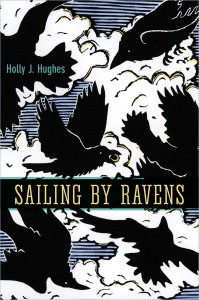 Sailing by Ravens
Sailing by Ravens
Holly J. Hughes
University of Alaska Press, 2014
Holly J. Hughes’ recent collection of poetry, Sailing by Ravens, is an immersion into nautical language and life, and an exploration of what it means to live with direction and drift, two opposing energies that tug our human lives. Sailing by Ravens is arranged in sections like compass points: north, west, south & east—each section accruing depth about navigating the ocean, experiencing the loss of love, and an exploration of human losses. The collection acts like a plumb line measuring the depth of the charts and maps that Hughes learned to love so young in her life—a plumb line of the self, that “faint tick tick of the heart.”
The collection’s first section, “North,” draws subtle connections between map makers and self makers. “X saying here,” Hughes writes, offering a destination to be measured in degrees yet “wrenched from time.” The tension in this section quietly builds in the differentiation between actual and magnetic direction, in how the slightest metal objects on a boat can effect the path that will be sailed. As a reader, I can’t help but to be drawn to my own map of decisions on the wall. This is what good poetry does, right? Leaves enough space for the reader to enter your lines and go on the ride with you. Teaches you something about yourself as a launching pad for understanding the greater questions and tensions of life.
As Sailing by Ravens goes forward, the sky and stars remain fixed points, yet unreachable, and somehow in this inability to touch—a penetrating fog—we find our humanity: faith and belief become new compass points. The collection challenges our human perceptions at the end of “West,” with “Bravo Ocean,” a poem that seems to realize how small the planet really is—oceans included. After the ephemeral vastness and history of the poems in this section, we hear underwater cables carrying music from Handel from a phonograph in 1906, and how ships dropped anchor to listen. The poem captures this moment, as if stilling a photograph that captures a change in human consciousness: we are not alone; not ever, in this interconnected world of language.
The body enters this collection most visibly in the third section, and as a reader I am ready for the self to exist more explicitly within the metaphorical framework of the collection’s first half. Hughes writes, “Our bodies an accumulation of coordinates, paths not / taken, streets pulled up short, lonely alleys, dead ends,” and she concludes that these paths and decisions are “how we stay alive.” Hughes’ writing is at its best in “Tied, Untied,” a poem that illustrates literal and metaphoric tying of knots, knots that cause resistance and are pulled apart again—until the poem’s third section when knots that are “circling certainty” are described as hold against drift, and the poem’s “I” realizes that “it’s me who’s split.”
Following Hughes through this collection feels like being led by an experienced guide on a sailboat, yet the final trick is that the boat is made of experience and language, and we are all complicit in these experiences. The collection is patient and, not surprisingly, well-plotted. My only advice to the reader: the early half of the book builds slowly—the feeling of laying plank by plank down before you can see the blueprint—but the struggle is worth it. The collection’s subtle beginning made me question what was at stake for me—the reader. But as the themes open up, so does the author, and so does the experience for the reader. You’ll be glad to see the planet round, the universe curved, the hand of a god or a scientific account measuring it all.
—
Janie Elizabeth Miller lives just off the Washington coast on Vashon Island and teaches poetry and environmental writing at the University of Washington Tacoma. Her chapbook, Primitive Elegy, is forthcoming from Alice Blue Books and she won the Grand Prize at the Eco-Arts Awards in 2014. Visit janieelizabethmiller.com for publishing & performance details.
